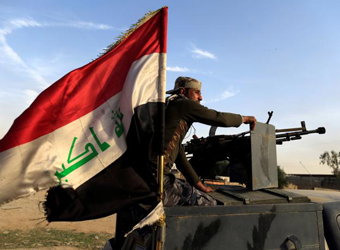Iraqi government forces have launched an offensive to liberate the western part of the city of Mosul from so-called Islamic State (ISIS).
Smoke rose over villages as hundreds of military vehicles, backed by air power, rolled across the desert towards the jihadists’ positions on Sunday.
The offensive was formally announced by Iraqi Prime Minister Haider al-Abadi.
Government forces retook the eastern side of the city, the last major ISIS stronghold in Iraq, last month.
But the western side- with its narrow, winding streets- may prove a bigger challenge.
The UN has voiced concern about civilians trapped there, amid reports that they could number up to 650,000.
Leaflets warning residents of an imminent offensive were earlier dropped over the west of the city.
“We announce the start of a new phase in the operation, we are coming to Nineveh to liberate the western side of Mosul,” Abadi said in a televised speech, referring to the province of which Mosul is the capital.
“Our forces are beginning the liberation of the citizens from the terror of Daesh (ISIS),” he added, quoted by AFP news agency.
Iraqi forces have now all but surrounded the western part of Mosul, while the U.S.-led coalition has been carrying out air strikes on ISIS targets.
Winning the city back has never been just about the military objective of driving IS out of its stronghold, the BBC’s Sebastian Usher says.
Minimising civilian casualties and avoiding reprisals will be key to regaining the trust of the city’s population in the Iraqi state itself, he adds.
The jihadist group burst on to the international scene in 2014 when it seized large swathes of territory in Syria and Iraq.
It has declared the establishment of a “caliphate” across the two countries – a state governed in accordance with Islamic law, or Sharia.
At its height, the group is thought to have controlled an area of about 210,000 sq km (81,000 sq miles) – roughly the size of the UK, but that area has shrunk.
U.S. forces estimated late last year that IS had been reduced to about 15,000 fighters following the reported death of about 45,000 fighters over two years.
The diminishing group has pursued a tactic of encouraging so-called lone-wolf attacks outside of its territory. The most deadly strike linked to the group killed 130 people in Paris in 2015.
The UN humanitarian co-ordinator for Iraq, Lise Grande, said on Saturday that all of the parties to the conflict do absolutely everything they can to ensure that civilians survive the battle, and that they live.
“Absolutely nothing is more important going into the campaign to retake western Mosul,” she added.
The offensive on the eastern part of the city was launched on 17 October, more than two years after jihadists overran Mosul before seizing control of much of northern and western Iraq.
Government forces only managed to secure the eastern part last month after fierce fighting.
Experts warn that western Mosul, although slightly smaller than the east, is more densely populated and includes districts that are seen as pro-ISIS.
The UN said in late January that almost half of all the casualties in Mosul were civilians. At least 1,096 have been killed and 694 injured across Nineveh province since the start of October.
Source: BBC


